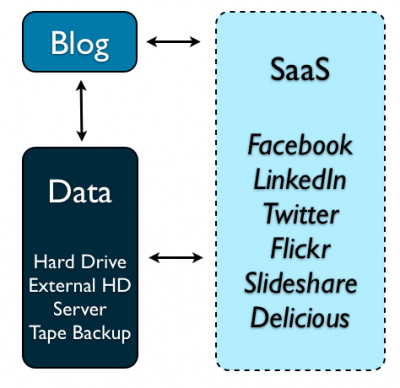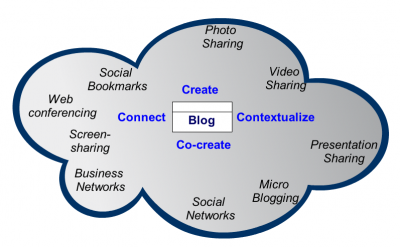Social media, open standards & curmudgeonliness.
The problem:
The increasing use of software as a service (SaaS)… is simple, easy and out of your control.
I guess I could sum it up in one single sentence: “The more heavily involved I’m with the various social networking sites available out there, the more I heart my own… blogs“.
…
It all has got to do with something as important as protecting your identity, your brand… your personal image, your own self in various social software spaces that more and more we seem to keep losing control over, and with no remedy.
A proposed solution:
I’ve decided to start the Curmudgeon’s Manifesto, which may serve as a call to arms to start dumping platforms that don’t understand how to play nice on the Internet. It’s our playground, and through our actions we get to set the rules of conduct.
Here’s my start (additions welcome):
- I will not use web services that hijack my data or that of my network.
- I will share openly on the Web and not constrain those with whom I share.
- I will not lead others into the temptation of using web services that do not respect privacy, re-use, open formats or exportable data.
An alternative solution:
An open standard is a standard that is publicly available and has various rights to use associated with it, and may also have various properties of how it was designed (e.g. open process).
…
The term “open standard” is sometimes coupled with “open source” with the idea that a standard is not truly open if it does not have a complete free/open source reference implementation available.
Friends are fun, but they’re only on some websites. OpenSocial helps these sites share their social data with the web. Applications that use the OpenSocial APIs can be embedded within a social network itself, or access a site’s social data from anywhere on the web.
One way to keep information accessible is to use an open, accessible, personal blog as the centre of your web presence.
OpenID is a decentralized standard, meaning it is not controlled by any one website or service provider. You control how much personal information you choose to share with websites that accept OpenIDs, and multiple OpenIDs can be used for different websites or purposes. If your email (Google, Yahoo, AOL), photo stream (Flickr) or blog (Blogger, WordPress, LiveJournal) serves as your primary online presence, OpenID allows you to use that portable identity across the web.
Conclusion:
Change the name of the Curmudgeon’s Manifesto to the Open Educators’ Manifesto (or similar). Back OpenID and OpenSocial. People like to sign up to positive-sounding things that cite big players or existing traction. I’m sure Chris Messina and other open (source/web) advocates have a take on this! 😀



